Financial Management: Bank of England and Monetary Policy Report
VerifiedAdded on 2020/01/07
|11
|3908
|184
Report
AI Summary
This report provides a comprehensive analysis of the Bank of England, focusing on its role in implementing monetary policy and managing the UK's financial institutions. It explores the central bank's functions, including setting interest rates, managing the money supply, and maintaining foreign exchange policies. The report examines the current economic environment of the Bank of England, including the effects of monetary policies on financial markets, such as the impact of negative interest rates and global issues on the UK's economy. It also investigates how authorized deposit institutions deal with and incorporate the Basel Accords to manage credit, liquidity, operating, and interest rate risks. The report highlights the Bank of England's influence on investment, portfolio positioning, and financial instruments, concluding with an assessment of the bank's effectiveness in maintaining economic stability and promoting financial growth within the UK and in the global market.

Financial Management
and Institutions
and Institutions
Paraphrase This Document
Need a fresh take? Get an instant paraphrase of this document with our AI Paraphraser
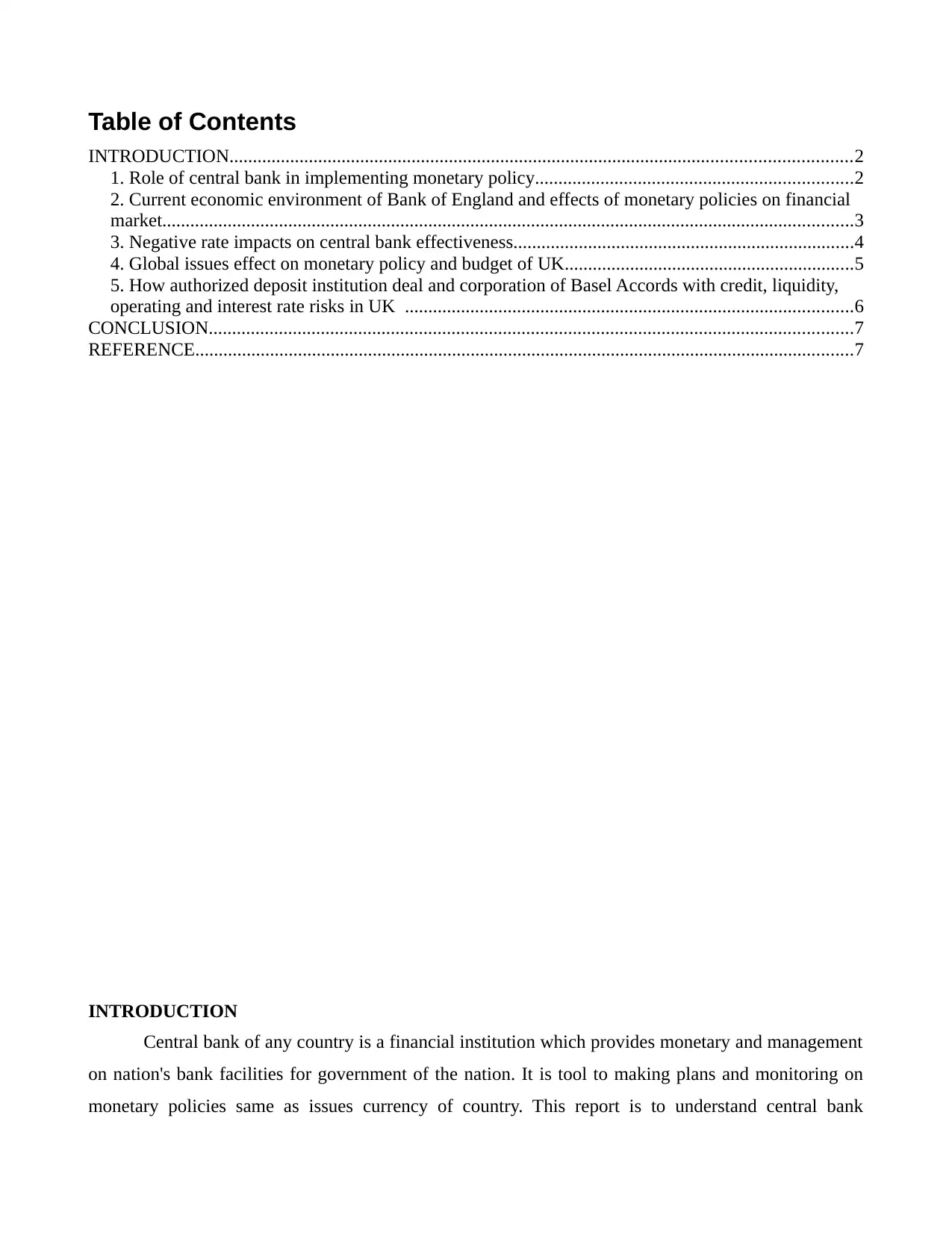
Table of Contents
INTRODUCTION.....................................................................................................................................2
1. Role of central bank in implementing monetary policy....................................................................2
2. Current economic environment of Bank of England and effects of monetary policies on financial
market....................................................................................................................................................3
3. Negative rate impacts on central bank effectiveness.........................................................................4
4. Global issues effect on monetary policy and budget of UK..............................................................5
5. How authorized deposit institution deal and corporation of Basel Accords with credit, liquidity,
operating and interest rate risks in UK ................................................................................................6
CONCLUSION..........................................................................................................................................7
REFERENCE.............................................................................................................................................7
INTRODUCTION
Central bank of any country is a financial institution which provides monetary and management
on nation's bank facilities for government of the nation. It is tool to making plans and monitoring on
monetary policies same as issues currency of country. This report is to understand central bank
INTRODUCTION.....................................................................................................................................2
1. Role of central bank in implementing monetary policy....................................................................2
2. Current economic environment of Bank of England and effects of monetary policies on financial
market....................................................................................................................................................3
3. Negative rate impacts on central bank effectiveness.........................................................................4
4. Global issues effect on monetary policy and budget of UK..............................................................5
5. How authorized deposit institution deal and corporation of Basel Accords with credit, liquidity,
operating and interest rate risks in UK ................................................................................................6
CONCLUSION..........................................................................................................................................7
REFERENCE.............................................................................................................................................7
INTRODUCTION
Central bank of any country is a financial institution which provides monetary and management
on nation's bank facilities for government of the nation. It is tool to making plans and monitoring on
monetary policies same as issues currency of country. This report is to understand central bank
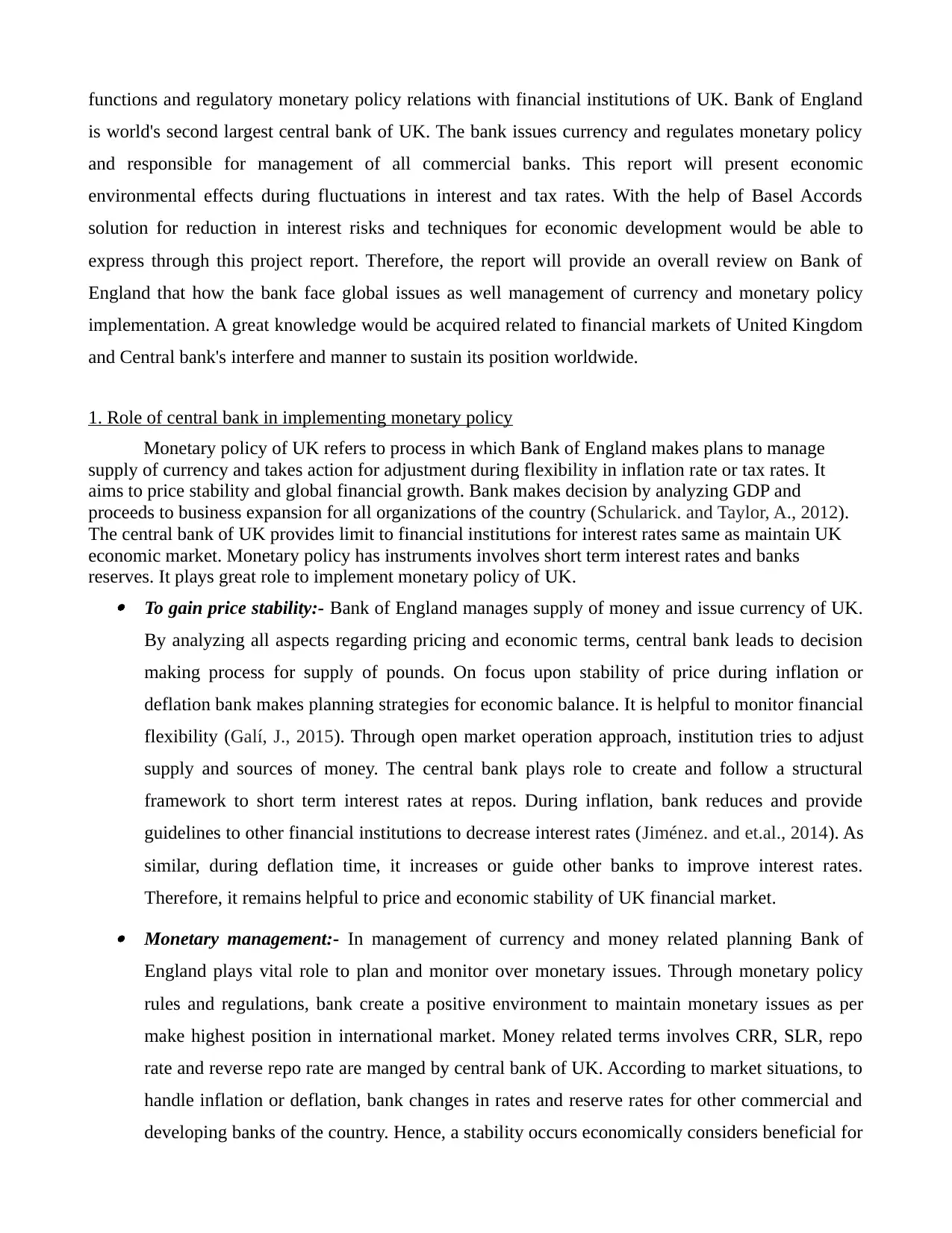
functions and regulatory monetary policy relations with financial institutions of UK. Bank of England
is world's second largest central bank of UK. The bank issues currency and regulates monetary policy
and responsible for management of all commercial banks. This report will present economic
environmental effects during fluctuations in interest and tax rates. With the help of Basel Accords
solution for reduction in interest risks and techniques for economic development would be able to
express through this project report. Therefore, the report will provide an overall review on Bank of
England that how the bank face global issues as well management of currency and monetary policy
implementation. A great knowledge would be acquired related to financial markets of United Kingdom
and Central bank's interfere and manner to sustain its position worldwide.
1. Role of central bank in implementing monetary policy
Monetary policy of UK refers to process in which Bank of England makes plans to manage
supply of currency and takes action for adjustment during flexibility in inflation rate or tax rates. It
aims to price stability and global financial growth. Bank makes decision by analyzing GDP and
proceeds to business expansion for all organizations of the country (Schularick. and Taylor, A., 2012).
The central bank of UK provides limit to financial institutions for interest rates same as maintain UK
economic market. Monetary policy has instruments involves short term interest rates and banks
reserves. It plays great role to implement monetary policy of UK. To gain price stability:- Bank of England manages supply of money and issue currency of UK.
By analyzing all aspects regarding pricing and economic terms, central bank leads to decision
making process for supply of pounds. On focus upon stability of price during inflation or
deflation bank makes planning strategies for economic balance. It is helpful to monitor financial
flexibility (Galí, J., 2015). Through open market operation approach, institution tries to adjust
supply and sources of money. The central bank plays role to create and follow a structural
framework to short term interest rates at repos. During inflation, bank reduces and provide
guidelines to other financial institutions to decrease interest rates (Jiménez. and et.al., 2014). As
similar, during deflation time, it increases or guide other banks to improve interest rates.
Therefore, it remains helpful to price and economic stability of UK financial market.
Monetary management:- In management of currency and money related planning Bank of
England plays vital role to plan and monitor over monetary issues. Through monetary policy
rules and regulations, bank create a positive environment to maintain monetary issues as per
make highest position in international market. Money related terms involves CRR, SLR, repo
rate and reverse repo rate are manged by central bank of UK. According to market situations, to
handle inflation or deflation, bank changes in rates and reserve rates for other commercial and
developing banks of the country. Hence, a stability occurs economically considers beneficial for
is world's second largest central bank of UK. The bank issues currency and regulates monetary policy
and responsible for management of all commercial banks. This report will present economic
environmental effects during fluctuations in interest and tax rates. With the help of Basel Accords
solution for reduction in interest risks and techniques for economic development would be able to
express through this project report. Therefore, the report will provide an overall review on Bank of
England that how the bank face global issues as well management of currency and monetary policy
implementation. A great knowledge would be acquired related to financial markets of United Kingdom
and Central bank's interfere and manner to sustain its position worldwide.
1. Role of central bank in implementing monetary policy
Monetary policy of UK refers to process in which Bank of England makes plans to manage
supply of currency and takes action for adjustment during flexibility in inflation rate or tax rates. It
aims to price stability and global financial growth. Bank makes decision by analyzing GDP and
proceeds to business expansion for all organizations of the country (Schularick. and Taylor, A., 2012).
The central bank of UK provides limit to financial institutions for interest rates same as maintain UK
economic market. Monetary policy has instruments involves short term interest rates and banks
reserves. It plays great role to implement monetary policy of UK. To gain price stability:- Bank of England manages supply of money and issue currency of UK.
By analyzing all aspects regarding pricing and economic terms, central bank leads to decision
making process for supply of pounds. On focus upon stability of price during inflation or
deflation bank makes planning strategies for economic balance. It is helpful to monitor financial
flexibility (Galí, J., 2015). Through open market operation approach, institution tries to adjust
supply and sources of money. The central bank plays role to create and follow a structural
framework to short term interest rates at repos. During inflation, bank reduces and provide
guidelines to other financial institutions to decrease interest rates (Jiménez. and et.al., 2014). As
similar, during deflation time, it increases or guide other banks to improve interest rates.
Therefore, it remains helpful to price and economic stability of UK financial market.
Monetary management:- In management of currency and money related planning Bank of
England plays vital role to plan and monitor over monetary issues. Through monetary policy
rules and regulations, bank create a positive environment to maintain monetary issues as per
make highest position in international market. Money related terms involves CRR, SLR, repo
rate and reverse repo rate are manged by central bank of UK. According to market situations, to
handle inflation or deflation, bank changes in rates and reserve rates for other commercial and
developing banks of the country. Hence, a stability occurs economically considers beneficial for
⊘ This is a preview!⊘
Do you want full access?
Subscribe today to unlock all pages.

Trusted by 1+ million students worldwide
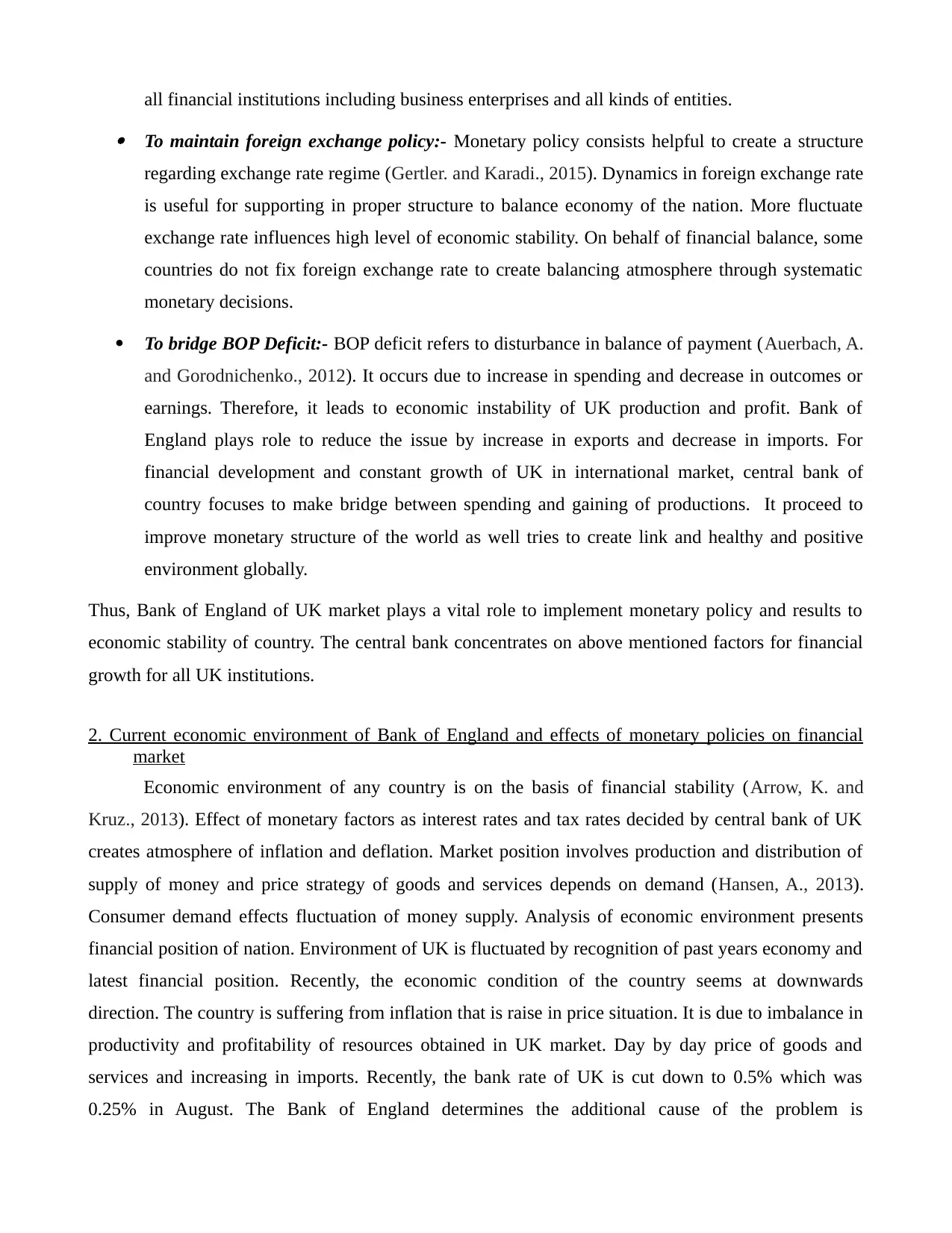
all financial institutions including business enterprises and all kinds of entities.
To maintain foreign exchange policy:- Monetary policy consists helpful to create a structure
regarding exchange rate regime (Gertler. and Karadi., 2015). Dynamics in foreign exchange rate
is useful for supporting in proper structure to balance economy of the nation. More fluctuate
exchange rate influences high level of economic stability. On behalf of financial balance, some
countries do not fix foreign exchange rate to create balancing atmosphere through systematic
monetary decisions.
To bridge BOP Deficit:- BOP deficit refers to disturbance in balance of payment (Auerbach, A.
and Gorodnichenko., 2012). It occurs due to increase in spending and decrease in outcomes or
earnings. Therefore, it leads to economic instability of UK production and profit. Bank of
England plays role to reduce the issue by increase in exports and decrease in imports. For
financial development and constant growth of UK in international market, central bank of
country focuses to make bridge between spending and gaining of productions. It proceed to
improve monetary structure of the world as well tries to create link and healthy and positive
environment globally.
Thus, Bank of England of UK market plays a vital role to implement monetary policy and results to
economic stability of country. The central bank concentrates on above mentioned factors for financial
growth for all UK institutions.
2. Current economic environment of Bank of England and effects of monetary policies on financial
market
Economic environment of any country is on the basis of financial stability (Arrow, K. and
Kruz., 2013). Effect of monetary factors as interest rates and tax rates decided by central bank of UK
creates atmosphere of inflation and deflation. Market position involves production and distribution of
supply of money and price strategy of goods and services depends on demand (Hansen, A., 2013).
Consumer demand effects fluctuation of money supply. Analysis of economic environment presents
financial position of nation. Environment of UK is fluctuated by recognition of past years economy and
latest financial position. Recently, the economic condition of the country seems at downwards
direction. The country is suffering from inflation that is raise in price situation. It is due to imbalance in
productivity and profitability of resources obtained in UK market. Day by day price of goods and
services and increasing in imports. Recently, the bank rate of UK is cut down to 0.5% which was
0.25% in August. The Bank of England determines the additional cause of the problem is
To maintain foreign exchange policy:- Monetary policy consists helpful to create a structure
regarding exchange rate regime (Gertler. and Karadi., 2015). Dynamics in foreign exchange rate
is useful for supporting in proper structure to balance economy of the nation. More fluctuate
exchange rate influences high level of economic stability. On behalf of financial balance, some
countries do not fix foreign exchange rate to create balancing atmosphere through systematic
monetary decisions.
To bridge BOP Deficit:- BOP deficit refers to disturbance in balance of payment (Auerbach, A.
and Gorodnichenko., 2012). It occurs due to increase in spending and decrease in outcomes or
earnings. Therefore, it leads to economic instability of UK production and profit. Bank of
England plays role to reduce the issue by increase in exports and decrease in imports. For
financial development and constant growth of UK in international market, central bank of
country focuses to make bridge between spending and gaining of productions. It proceed to
improve monetary structure of the world as well tries to create link and healthy and positive
environment globally.
Thus, Bank of England of UK market plays a vital role to implement monetary policy and results to
economic stability of country. The central bank concentrates on above mentioned factors for financial
growth for all UK institutions.
2. Current economic environment of Bank of England and effects of monetary policies on financial
market
Economic environment of any country is on the basis of financial stability (Arrow, K. and
Kruz., 2013). Effect of monetary factors as interest rates and tax rates decided by central bank of UK
creates atmosphere of inflation and deflation. Market position involves production and distribution of
supply of money and price strategy of goods and services depends on demand (Hansen, A., 2013).
Consumer demand effects fluctuation of money supply. Analysis of economic environment presents
financial position of nation. Environment of UK is fluctuated by recognition of past years economy and
latest financial position. Recently, the economic condition of the country seems at downwards
direction. The country is suffering from inflation that is raise in price situation. It is due to imbalance in
productivity and profitability of resources obtained in UK market. Day by day price of goods and
services and increasing in imports. Recently, the bank rate of UK is cut down to 0.5% which was
0.25% in August. The Bank of England determines the additional cause of the problem is
Paraphrase This Document
Need a fresh take? Get an instant paraphrase of this document with our AI Paraphraser
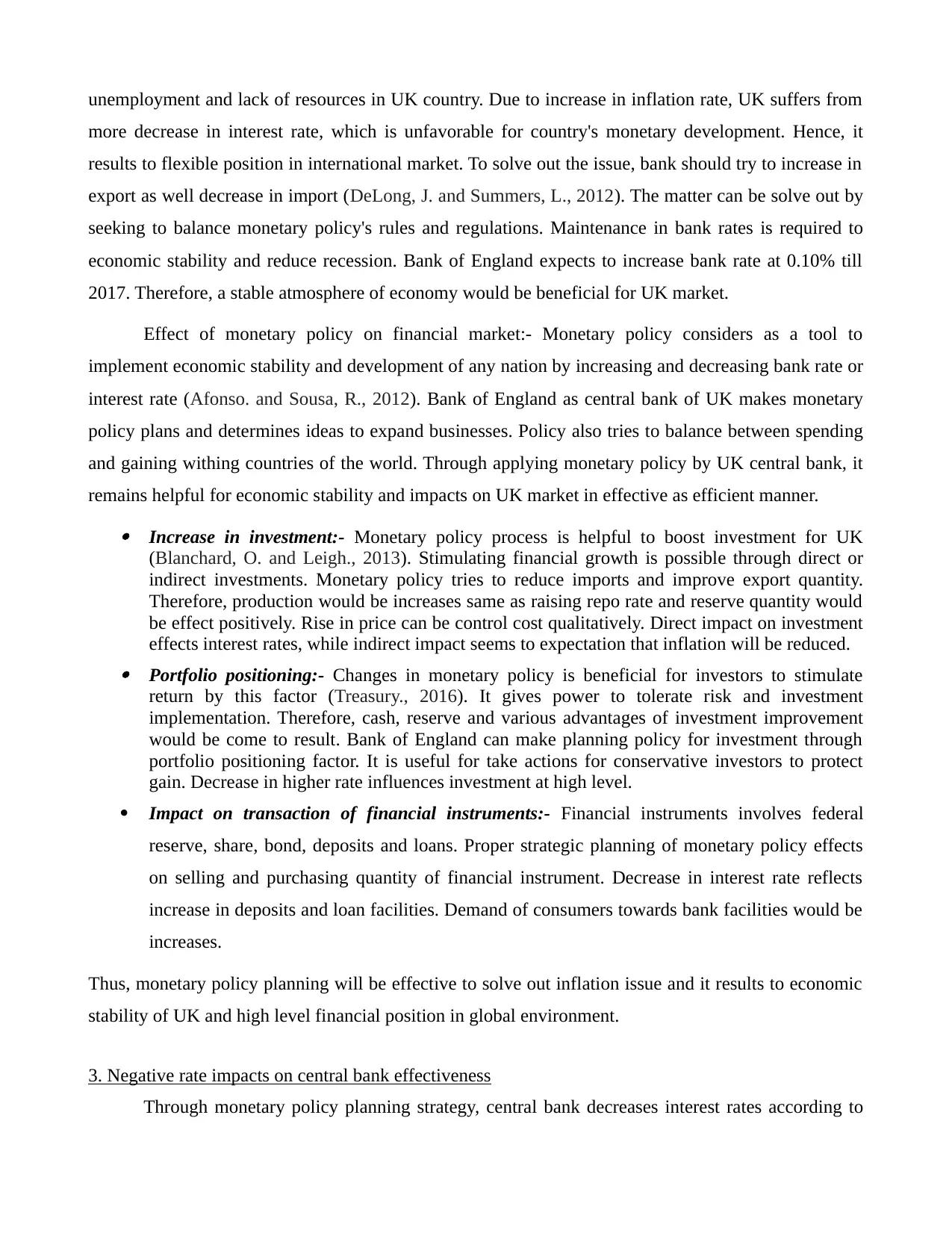
unemployment and lack of resources in UK country. Due to increase in inflation rate, UK suffers from
more decrease in interest rate, which is unfavorable for country's monetary development. Hence, it
results to flexible position in international market. To solve out the issue, bank should try to increase in
export as well decrease in import (DeLong, J. and Summers, L., 2012). The matter can be solve out by
seeking to balance monetary policy's rules and regulations. Maintenance in bank rates is required to
economic stability and reduce recession. Bank of England expects to increase bank rate at 0.10% till
2017. Therefore, a stable atmosphere of economy would be beneficial for UK market.
Effect of monetary policy on financial market:- Monetary policy considers as a tool to
implement economic stability and development of any nation by increasing and decreasing bank rate or
interest rate (Afonso. and Sousa, R., 2012). Bank of England as central bank of UK makes monetary
policy plans and determines ideas to expand businesses. Policy also tries to balance between spending
and gaining withing countries of the world. Through applying monetary policy by UK central bank, it
remains helpful for economic stability and impacts on UK market in effective as efficient manner. Increase in investment:- Monetary policy process is helpful to boost investment for UK
(Blanchard, O. and Leigh., 2013). Stimulating financial growth is possible through direct or
indirect investments. Monetary policy tries to reduce imports and improve export quantity.
Therefore, production would be increases same as raising repo rate and reserve quantity would
be effect positively. Rise in price can be control cost qualitatively. Direct impact on investment
effects interest rates, while indirect impact seems to expectation that inflation will be reduced. Portfolio positioning:- Changes in monetary policy is beneficial for investors to stimulate
return by this factor (Treasury., 2016). It gives power to tolerate risk and investment
implementation. Therefore, cash, reserve and various advantages of investment improvement
would be come to result. Bank of England can make planning policy for investment through
portfolio positioning factor. It is useful for take actions for conservative investors to protect
gain. Decrease in higher rate influences investment at high level.
Impact on transaction of financial instruments:- Financial instruments involves federal
reserve, share, bond, deposits and loans. Proper strategic planning of monetary policy effects
on selling and purchasing quantity of financial instrument. Decrease in interest rate reflects
increase in deposits and loan facilities. Demand of consumers towards bank facilities would be
increases.
Thus, monetary policy planning will be effective to solve out inflation issue and it results to economic
stability of UK and high level financial position in global environment.
3. Negative rate impacts on central bank effectiveness
Through monetary policy planning strategy, central bank decreases interest rates according to
more decrease in interest rate, which is unfavorable for country's monetary development. Hence, it
results to flexible position in international market. To solve out the issue, bank should try to increase in
export as well decrease in import (DeLong, J. and Summers, L., 2012). The matter can be solve out by
seeking to balance monetary policy's rules and regulations. Maintenance in bank rates is required to
economic stability and reduce recession. Bank of England expects to increase bank rate at 0.10% till
2017. Therefore, a stable atmosphere of economy would be beneficial for UK market.
Effect of monetary policy on financial market:- Monetary policy considers as a tool to
implement economic stability and development of any nation by increasing and decreasing bank rate or
interest rate (Afonso. and Sousa, R., 2012). Bank of England as central bank of UK makes monetary
policy plans and determines ideas to expand businesses. Policy also tries to balance between spending
and gaining withing countries of the world. Through applying monetary policy by UK central bank, it
remains helpful for economic stability and impacts on UK market in effective as efficient manner. Increase in investment:- Monetary policy process is helpful to boost investment for UK
(Blanchard, O. and Leigh., 2013). Stimulating financial growth is possible through direct or
indirect investments. Monetary policy tries to reduce imports and improve export quantity.
Therefore, production would be increases same as raising repo rate and reserve quantity would
be effect positively. Rise in price can be control cost qualitatively. Direct impact on investment
effects interest rates, while indirect impact seems to expectation that inflation will be reduced. Portfolio positioning:- Changes in monetary policy is beneficial for investors to stimulate
return by this factor (Treasury., 2016). It gives power to tolerate risk and investment
implementation. Therefore, cash, reserve and various advantages of investment improvement
would be come to result. Bank of England can make planning policy for investment through
portfolio positioning factor. It is useful for take actions for conservative investors to protect
gain. Decrease in higher rate influences investment at high level.
Impact on transaction of financial instruments:- Financial instruments involves federal
reserve, share, bond, deposits and loans. Proper strategic planning of monetary policy effects
on selling and purchasing quantity of financial instrument. Decrease in interest rate reflects
increase in deposits and loan facilities. Demand of consumers towards bank facilities would be
increases.
Thus, monetary policy planning will be effective to solve out inflation issue and it results to economic
stability of UK and high level financial position in global environment.
3. Negative rate impacts on central bank effectiveness
Through monetary policy planning strategy, central bank decreases interest rates according to
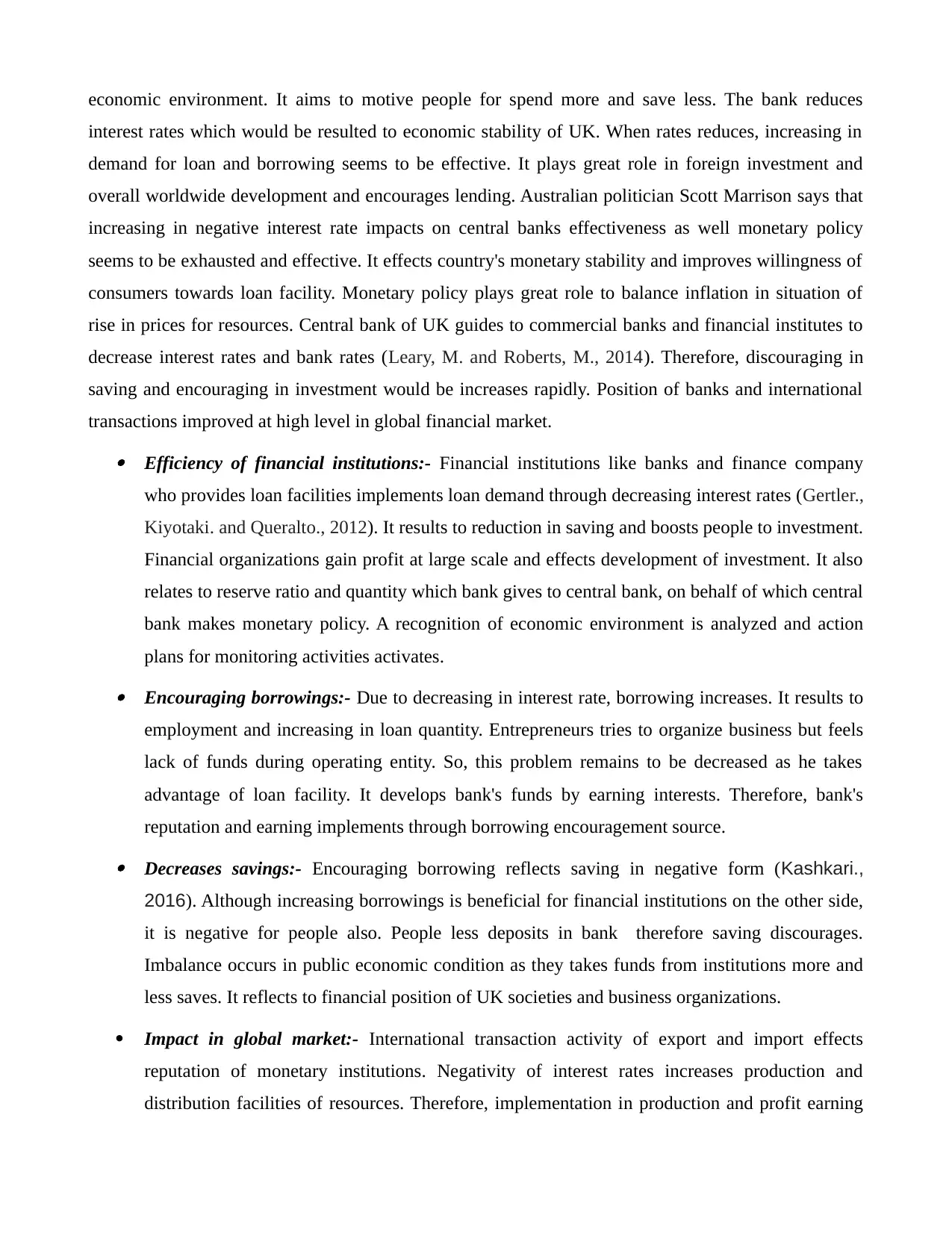
economic environment. It aims to motive people for spend more and save less. The bank reduces
interest rates which would be resulted to economic stability of UK. When rates reduces, increasing in
demand for loan and borrowing seems to be effective. It plays great role in foreign investment and
overall worldwide development and encourages lending. Australian politician Scott Marrison says that
increasing in negative interest rate impacts on central banks effectiveness as well monetary policy
seems to be exhausted and effective. It effects country's monetary stability and improves willingness of
consumers towards loan facility. Monetary policy plays great role to balance inflation in situation of
rise in prices for resources. Central bank of UK guides to commercial banks and financial institutes to
decrease interest rates and bank rates (Leary, M. and Roberts, M., 2014). Therefore, discouraging in
saving and encouraging in investment would be increases rapidly. Position of banks and international
transactions improved at high level in global financial market.
Efficiency of financial institutions:- Financial institutions like banks and finance company
who provides loan facilities implements loan demand through decreasing interest rates (Gertler.,
Kiyotaki. and Queralto., 2012). It results to reduction in saving and boosts people to investment.
Financial organizations gain profit at large scale and effects development of investment. It also
relates to reserve ratio and quantity which bank gives to central bank, on behalf of which central
bank makes monetary policy. A recognition of economic environment is analyzed and action
plans for monitoring activities activates.
Encouraging borrowings:- Due to decreasing in interest rate, borrowing increases. It results to
employment and increasing in loan quantity. Entrepreneurs tries to organize business but feels
lack of funds during operating entity. So, this problem remains to be decreased as he takes
advantage of loan facility. It develops bank's funds by earning interests. Therefore, bank's
reputation and earning implements through borrowing encouragement source.
Decreases savings:- Encouraging borrowing reflects saving in negative form (Kashkari.,
2016). Although increasing borrowings is beneficial for financial institutions on the other side,
it is negative for people also. People less deposits in bank therefore saving discourages.
Imbalance occurs in public economic condition as they takes funds from institutions more and
less saves. It reflects to financial position of UK societies and business organizations.
Impact in global market:- International transaction activity of export and import effects
reputation of monetary institutions. Negativity of interest rates increases production and
distribution facilities of resources. Therefore, implementation in production and profit earning
interest rates which would be resulted to economic stability of UK. When rates reduces, increasing in
demand for loan and borrowing seems to be effective. It plays great role in foreign investment and
overall worldwide development and encourages lending. Australian politician Scott Marrison says that
increasing in negative interest rate impacts on central banks effectiveness as well monetary policy
seems to be exhausted and effective. It effects country's monetary stability and improves willingness of
consumers towards loan facility. Monetary policy plays great role to balance inflation in situation of
rise in prices for resources. Central bank of UK guides to commercial banks and financial institutes to
decrease interest rates and bank rates (Leary, M. and Roberts, M., 2014). Therefore, discouraging in
saving and encouraging in investment would be increases rapidly. Position of banks and international
transactions improved at high level in global financial market.
Efficiency of financial institutions:- Financial institutions like banks and finance company
who provides loan facilities implements loan demand through decreasing interest rates (Gertler.,
Kiyotaki. and Queralto., 2012). It results to reduction in saving and boosts people to investment.
Financial organizations gain profit at large scale and effects development of investment. It also
relates to reserve ratio and quantity which bank gives to central bank, on behalf of which central
bank makes monetary policy. A recognition of economic environment is analyzed and action
plans for monitoring activities activates.
Encouraging borrowings:- Due to decreasing in interest rate, borrowing increases. It results to
employment and increasing in loan quantity. Entrepreneurs tries to organize business but feels
lack of funds during operating entity. So, this problem remains to be decreased as he takes
advantage of loan facility. It develops bank's funds by earning interests. Therefore, bank's
reputation and earning implements through borrowing encouragement source.
Decreases savings:- Encouraging borrowing reflects saving in negative form (Kashkari.,
2016). Although increasing borrowings is beneficial for financial institutions on the other side,
it is negative for people also. People less deposits in bank therefore saving discourages.
Imbalance occurs in public economic condition as they takes funds from institutions more and
less saves. It reflects to financial position of UK societies and business organizations.
Impact in global market:- International transaction activity of export and import effects
reputation of monetary institutions. Negativity of interest rates increases production and
distribution facilities of resources. Therefore, implementation in production and profit earning
⊘ This is a preview!⊘
Do you want full access?
Subscribe today to unlock all pages.

Trusted by 1+ million students worldwide
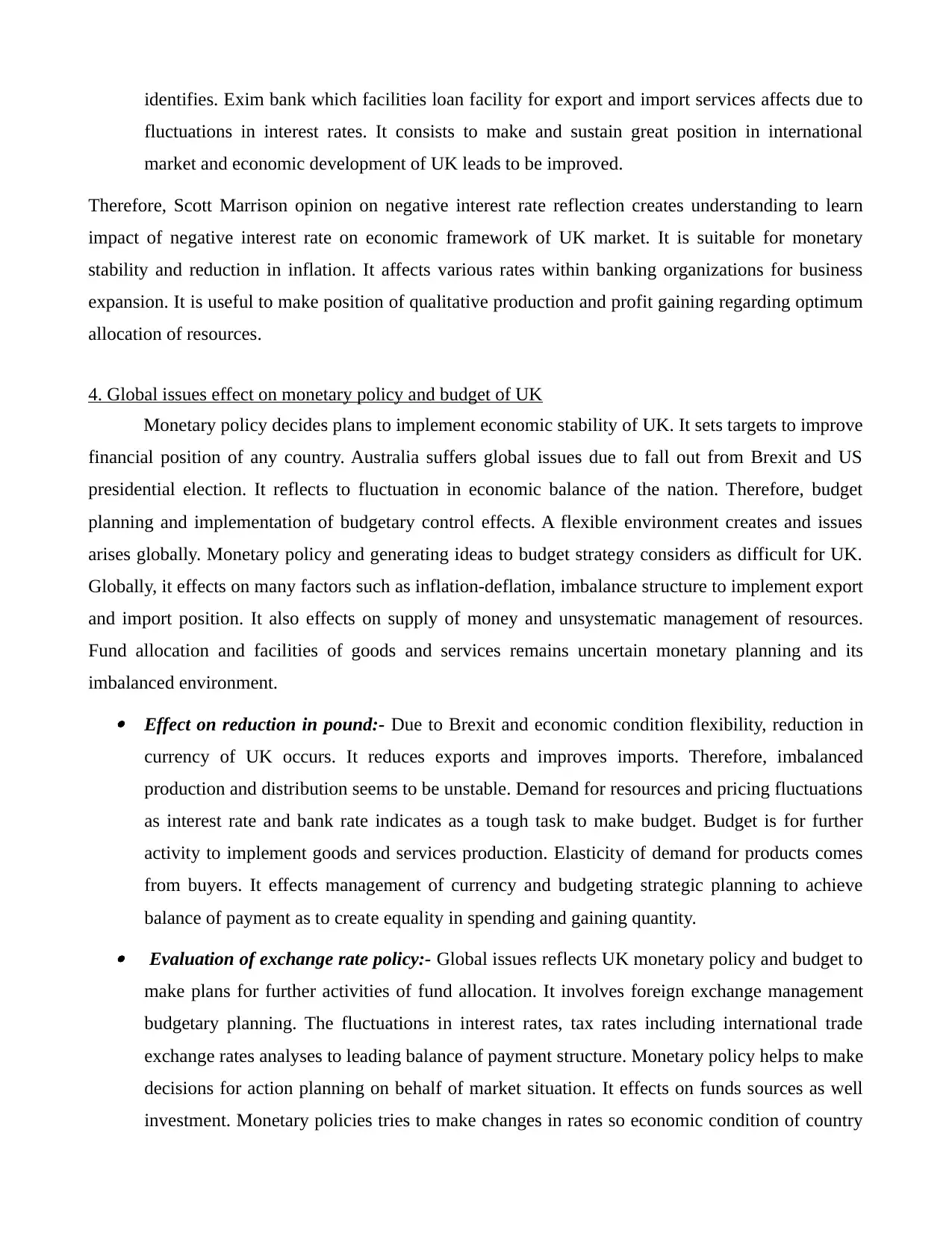
identifies. Exim bank which facilities loan facility for export and import services affects due to
fluctuations in interest rates. It consists to make and sustain great position in international
market and economic development of UK leads to be improved.
Therefore, Scott Marrison opinion on negative interest rate reflection creates understanding to learn
impact of negative interest rate on economic framework of UK market. It is suitable for monetary
stability and reduction in inflation. It affects various rates within banking organizations for business
expansion. It is useful to make position of qualitative production and profit gaining regarding optimum
allocation of resources.
4. Global issues effect on monetary policy and budget of UK
Monetary policy decides plans to implement economic stability of UK. It sets targets to improve
financial position of any country. Australia suffers global issues due to fall out from Brexit and US
presidential election. It reflects to fluctuation in economic balance of the nation. Therefore, budget
planning and implementation of budgetary control effects. A flexible environment creates and issues
arises globally. Monetary policy and generating ideas to budget strategy considers as difficult for UK.
Globally, it effects on many factors such as inflation-deflation, imbalance structure to implement export
and import position. It also effects on supply of money and unsystematic management of resources.
Fund allocation and facilities of goods and services remains uncertain monetary planning and its
imbalanced environment.
Effect on reduction in pound:- Due to Brexit and economic condition flexibility, reduction in
currency of UK occurs. It reduces exports and improves imports. Therefore, imbalanced
production and distribution seems to be unstable. Demand for resources and pricing fluctuations
as interest rate and bank rate indicates as a tough task to make budget. Budget is for further
activity to implement goods and services production. Elasticity of demand for products comes
from buyers. It effects management of currency and budgeting strategic planning to achieve
balance of payment as to create equality in spending and gaining quantity.
Evaluation of exchange rate policy:- Global issues reflects UK monetary policy and budget to
make plans for further activities of fund allocation. It involves foreign exchange management
budgetary planning. The fluctuations in interest rates, tax rates including international trade
exchange rates analyses to leading balance of payment structure. Monetary policy helps to make
decisions for action planning on behalf of market situation. It effects on funds sources as well
investment. Monetary policies tries to make changes in rates so economic condition of country
fluctuations in interest rates. It consists to make and sustain great position in international
market and economic development of UK leads to be improved.
Therefore, Scott Marrison opinion on negative interest rate reflection creates understanding to learn
impact of negative interest rate on economic framework of UK market. It is suitable for monetary
stability and reduction in inflation. It affects various rates within banking organizations for business
expansion. It is useful to make position of qualitative production and profit gaining regarding optimum
allocation of resources.
4. Global issues effect on monetary policy and budget of UK
Monetary policy decides plans to implement economic stability of UK. It sets targets to improve
financial position of any country. Australia suffers global issues due to fall out from Brexit and US
presidential election. It reflects to fluctuation in economic balance of the nation. Therefore, budget
planning and implementation of budgetary control effects. A flexible environment creates and issues
arises globally. Monetary policy and generating ideas to budget strategy considers as difficult for UK.
Globally, it effects on many factors such as inflation-deflation, imbalance structure to implement export
and import position. It also effects on supply of money and unsystematic management of resources.
Fund allocation and facilities of goods and services remains uncertain monetary planning and its
imbalanced environment.
Effect on reduction in pound:- Due to Brexit and economic condition flexibility, reduction in
currency of UK occurs. It reduces exports and improves imports. Therefore, imbalanced
production and distribution seems to be unstable. Demand for resources and pricing fluctuations
as interest rate and bank rate indicates as a tough task to make budget. Budget is for further
activity to implement goods and services production. Elasticity of demand for products comes
from buyers. It effects management of currency and budgeting strategic planning to achieve
balance of payment as to create equality in spending and gaining quantity.
Evaluation of exchange rate policy:- Global issues reflects UK monetary policy and budget to
make plans for further activities of fund allocation. It involves foreign exchange management
budgetary planning. The fluctuations in interest rates, tax rates including international trade
exchange rates analyses to leading balance of payment structure. Monetary policy helps to make
decisions for action planning on behalf of market situation. It effects on funds sources as well
investment. Monetary policies tries to make changes in rates so economic condition of country
Paraphrase This Document
Need a fresh take? Get an instant paraphrase of this document with our AI Paraphraser
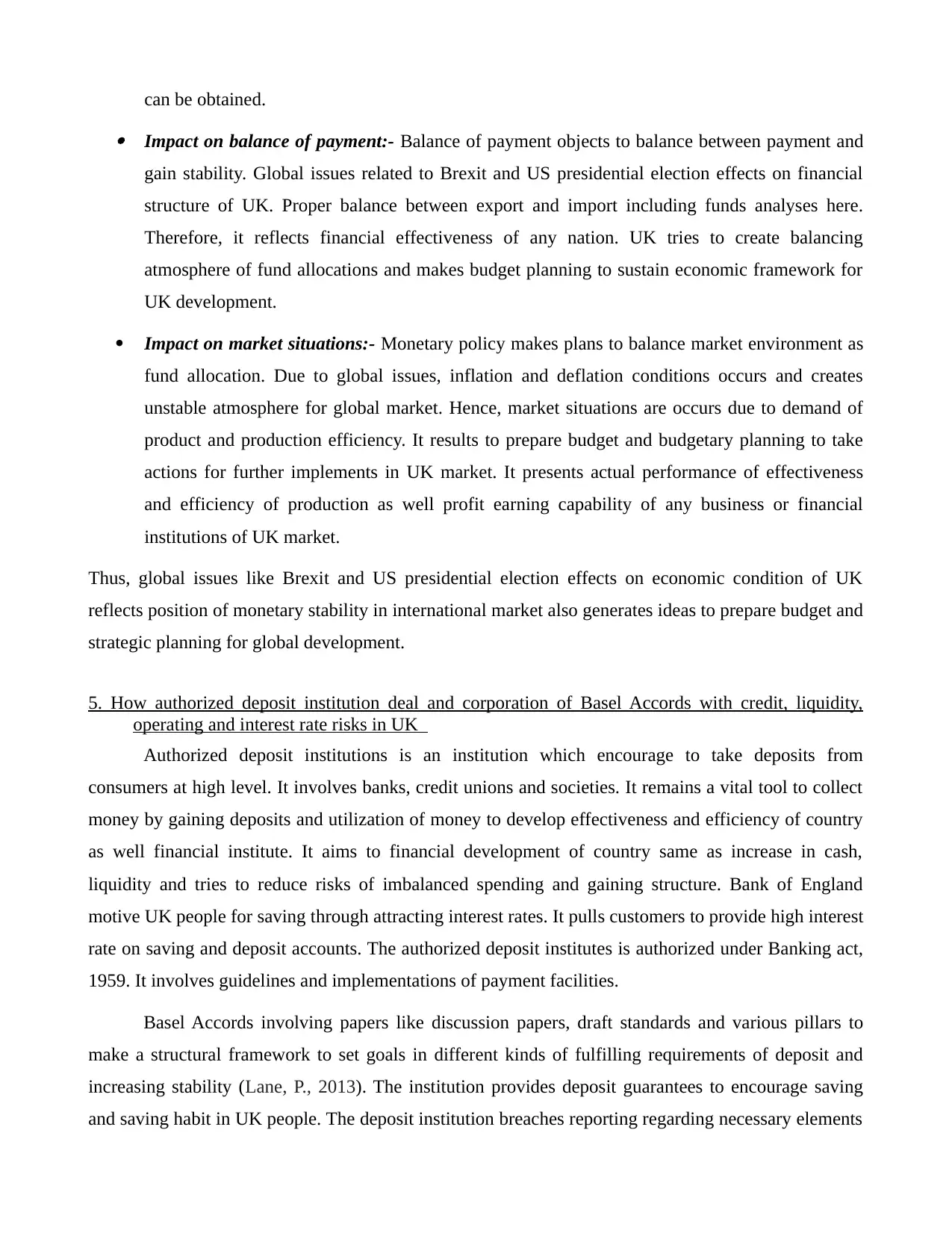
can be obtained.
Impact on balance of payment:- Balance of payment objects to balance between payment and
gain stability. Global issues related to Brexit and US presidential election effects on financial
structure of UK. Proper balance between export and import including funds analyses here.
Therefore, it reflects financial effectiveness of any nation. UK tries to create balancing
atmosphere of fund allocations and makes budget planning to sustain economic framework for
UK development.
Impact on market situations:- Monetary policy makes plans to balance market environment as
fund allocation. Due to global issues, inflation and deflation conditions occurs and creates
unstable atmosphere for global market. Hence, market situations are occurs due to demand of
product and production efficiency. It results to prepare budget and budgetary planning to take
actions for further implements in UK market. It presents actual performance of effectiveness
and efficiency of production as well profit earning capability of any business or financial
institutions of UK market.
Thus, global issues like Brexit and US presidential election effects on economic condition of UK
reflects position of monetary stability in international market also generates ideas to prepare budget and
strategic planning for global development.
5. How authorized deposit institution deal and corporation of Basel Accords with credit, liquidity,
operating and interest rate risks in UK
Authorized deposit institutions is an institution which encourage to take deposits from
consumers at high level. It involves banks, credit unions and societies. It remains a vital tool to collect
money by gaining deposits and utilization of money to develop effectiveness and efficiency of country
as well financial institute. It aims to financial development of country same as increase in cash,
liquidity and tries to reduce risks of imbalanced spending and gaining structure. Bank of England
motive UK people for saving through attracting interest rates. It pulls customers to provide high interest
rate on saving and deposit accounts. The authorized deposit institutes is authorized under Banking act,
1959. It involves guidelines and implementations of payment facilities.
Basel Accords involving papers like discussion papers, draft standards and various pillars to
make a structural framework to set goals in different kinds of fulfilling requirements of deposit and
increasing stability (Lane, P., 2013). The institution provides deposit guarantees to encourage saving
and saving habit in UK people. The deposit institution breaches reporting regarding necessary elements
Impact on balance of payment:- Balance of payment objects to balance between payment and
gain stability. Global issues related to Brexit and US presidential election effects on financial
structure of UK. Proper balance between export and import including funds analyses here.
Therefore, it reflects financial effectiveness of any nation. UK tries to create balancing
atmosphere of fund allocations and makes budget planning to sustain economic framework for
UK development.
Impact on market situations:- Monetary policy makes plans to balance market environment as
fund allocation. Due to global issues, inflation and deflation conditions occurs and creates
unstable atmosphere for global market. Hence, market situations are occurs due to demand of
product and production efficiency. It results to prepare budget and budgetary planning to take
actions for further implements in UK market. It presents actual performance of effectiveness
and efficiency of production as well profit earning capability of any business or financial
institutions of UK market.
Thus, global issues like Brexit and US presidential election effects on economic condition of UK
reflects position of monetary stability in international market also generates ideas to prepare budget and
strategic planning for global development.
5. How authorized deposit institution deal and corporation of Basel Accords with credit, liquidity,
operating and interest rate risks in UK
Authorized deposit institutions is an institution which encourage to take deposits from
consumers at high level. It involves banks, credit unions and societies. It remains a vital tool to collect
money by gaining deposits and utilization of money to develop effectiveness and efficiency of country
as well financial institute. It aims to financial development of country same as increase in cash,
liquidity and tries to reduce risks of imbalanced spending and gaining structure. Bank of England
motive UK people for saving through attracting interest rates. It pulls customers to provide high interest
rate on saving and deposit accounts. The authorized deposit institutes is authorized under Banking act,
1959. It involves guidelines and implementations of payment facilities.
Basel Accords involving papers like discussion papers, draft standards and various pillars to
make a structural framework to set goals in different kinds of fulfilling requirements of deposit and
increasing stability (Lane, P., 2013). The institution provides deposit guarantees to encourage saving
and saving habit in UK people. The deposit institution breaches reporting regarding necessary elements
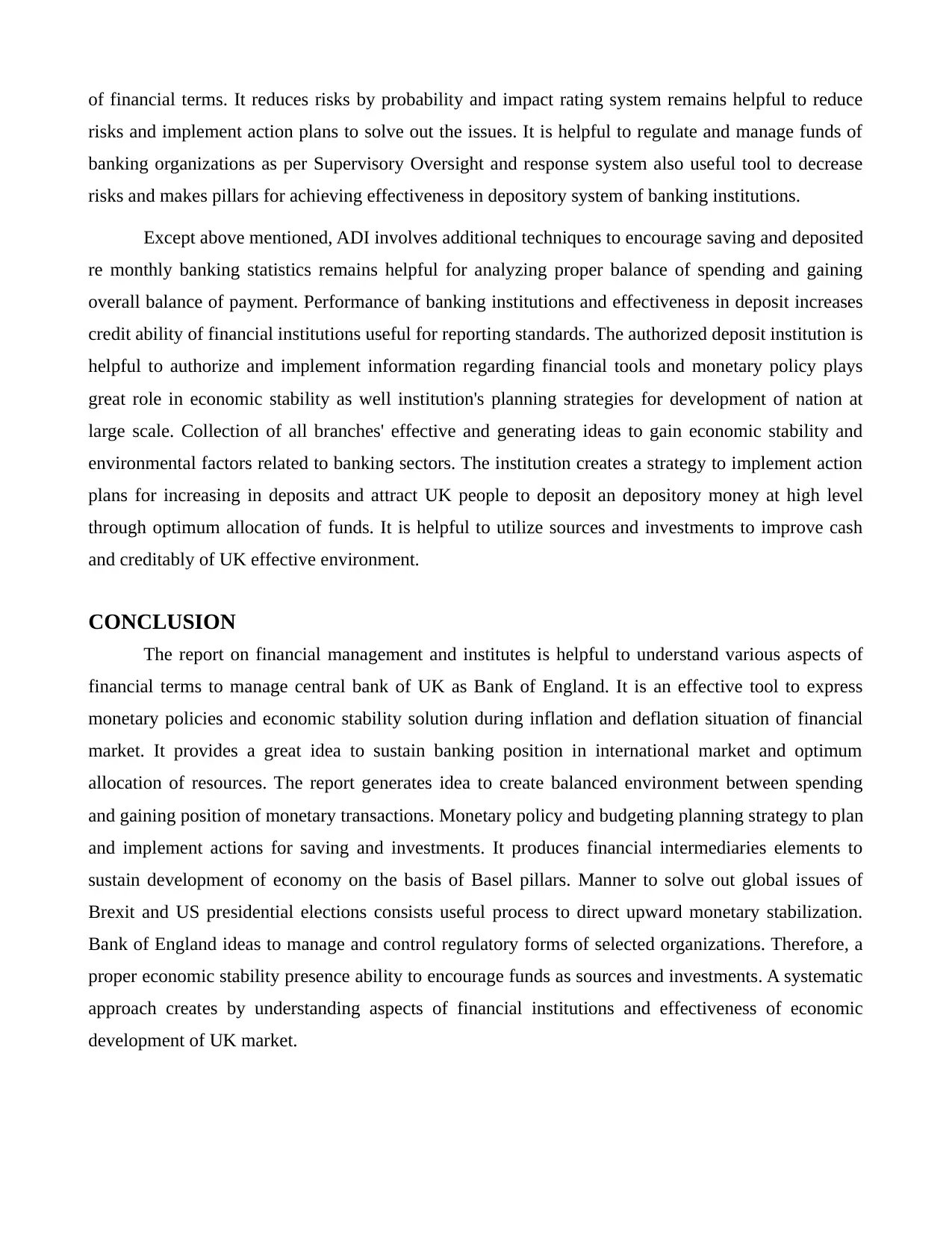
of financial terms. It reduces risks by probability and impact rating system remains helpful to reduce
risks and implement action plans to solve out the issues. It is helpful to regulate and manage funds of
banking organizations as per Supervisory Oversight and response system also useful tool to decrease
risks and makes pillars for achieving effectiveness in depository system of banking institutions.
Except above mentioned, ADI involves additional techniques to encourage saving and deposited
re monthly banking statistics remains helpful for analyzing proper balance of spending and gaining
overall balance of payment. Performance of banking institutions and effectiveness in deposit increases
credit ability of financial institutions useful for reporting standards. The authorized deposit institution is
helpful to authorize and implement information regarding financial tools and monetary policy plays
great role in economic stability as well institution's planning strategies for development of nation at
large scale. Collection of all branches' effective and generating ideas to gain economic stability and
environmental factors related to banking sectors. The institution creates a strategy to implement action
plans for increasing in deposits and attract UK people to deposit an depository money at high level
through optimum allocation of funds. It is helpful to utilize sources and investments to improve cash
and creditably of UK effective environment.
CONCLUSION
The report on financial management and institutes is helpful to understand various aspects of
financial terms to manage central bank of UK as Bank of England. It is an effective tool to express
monetary policies and economic stability solution during inflation and deflation situation of financial
market. It provides a great idea to sustain banking position in international market and optimum
allocation of resources. The report generates idea to create balanced environment between spending
and gaining position of monetary transactions. Monetary policy and budgeting planning strategy to plan
and implement actions for saving and investments. It produces financial intermediaries elements to
sustain development of economy on the basis of Basel pillars. Manner to solve out global issues of
Brexit and US presidential elections consists useful process to direct upward monetary stabilization.
Bank of England ideas to manage and control regulatory forms of selected organizations. Therefore, a
proper economic stability presence ability to encourage funds as sources and investments. A systematic
approach creates by understanding aspects of financial institutions and effectiveness of economic
development of UK market.
risks and implement action plans to solve out the issues. It is helpful to regulate and manage funds of
banking organizations as per Supervisory Oversight and response system also useful tool to decrease
risks and makes pillars for achieving effectiveness in depository system of banking institutions.
Except above mentioned, ADI involves additional techniques to encourage saving and deposited
re monthly banking statistics remains helpful for analyzing proper balance of spending and gaining
overall balance of payment. Performance of banking institutions and effectiveness in deposit increases
credit ability of financial institutions useful for reporting standards. The authorized deposit institution is
helpful to authorize and implement information regarding financial tools and monetary policy plays
great role in economic stability as well institution's planning strategies for development of nation at
large scale. Collection of all branches' effective and generating ideas to gain economic stability and
environmental factors related to banking sectors. The institution creates a strategy to implement action
plans for increasing in deposits and attract UK people to deposit an depository money at high level
through optimum allocation of funds. It is helpful to utilize sources and investments to improve cash
and creditably of UK effective environment.
CONCLUSION
The report on financial management and institutes is helpful to understand various aspects of
financial terms to manage central bank of UK as Bank of England. It is an effective tool to express
monetary policies and economic stability solution during inflation and deflation situation of financial
market. It provides a great idea to sustain banking position in international market and optimum
allocation of resources. The report generates idea to create balanced environment between spending
and gaining position of monetary transactions. Monetary policy and budgeting planning strategy to plan
and implement actions for saving and investments. It produces financial intermediaries elements to
sustain development of economy on the basis of Basel pillars. Manner to solve out global issues of
Brexit and US presidential elections consists useful process to direct upward monetary stabilization.
Bank of England ideas to manage and control regulatory forms of selected organizations. Therefore, a
proper economic stability presence ability to encourage funds as sources and investments. A systematic
approach creates by understanding aspects of financial institutions and effectiveness of economic
development of UK market.
⊘ This is a preview!⊘
Do you want full access?
Subscribe today to unlock all pages.

Trusted by 1+ million students worldwide
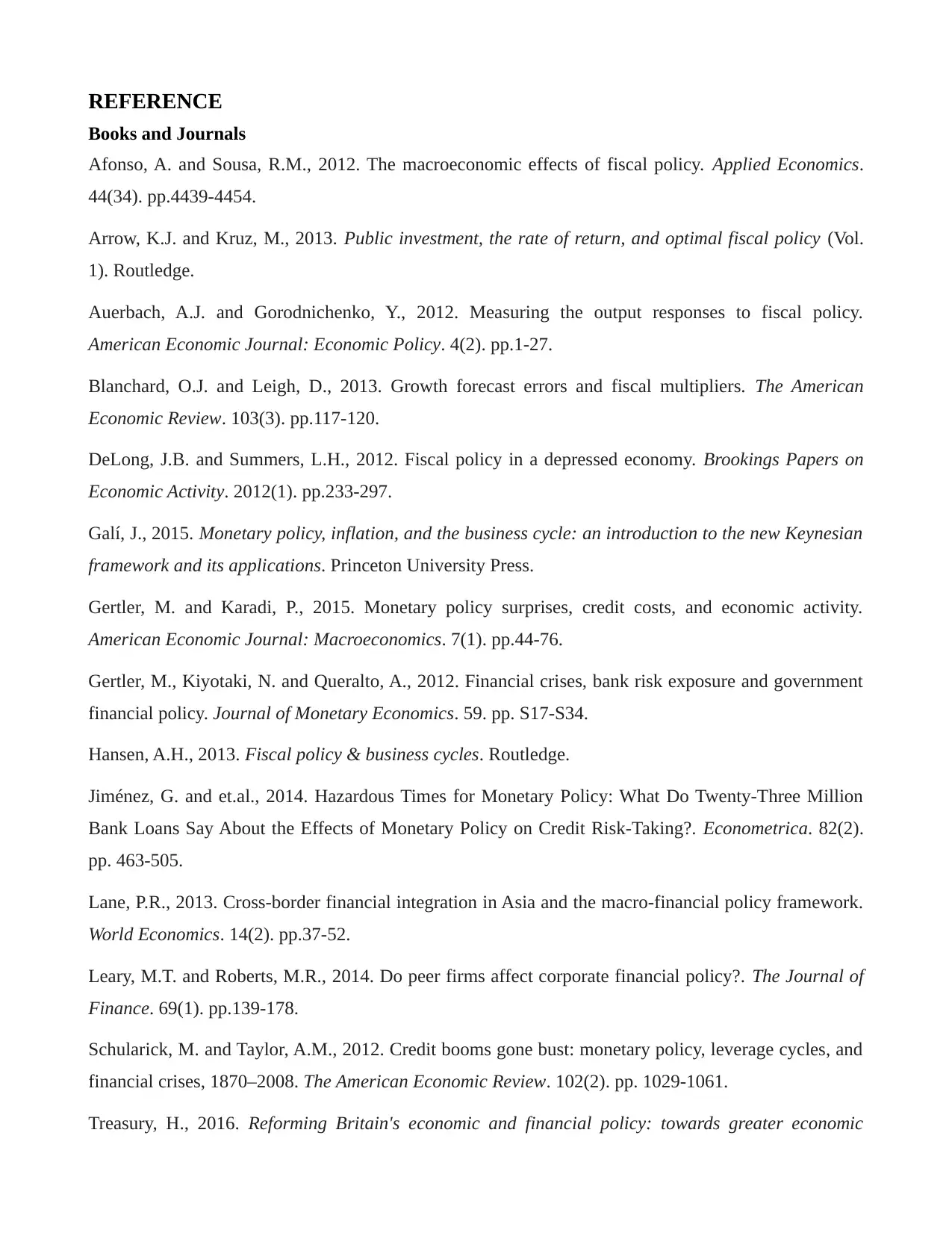
REFERENCE
Books and Journals
Afonso, A. and Sousa, R.M., 2012. The macroeconomic effects of fiscal policy. Applied Economics.
44(34). pp.4439-4454.
Arrow, K.J. and Kruz, M., 2013. Public investment, the rate of return, and optimal fiscal policy (Vol.
1). Routledge.
Auerbach, A.J. and Gorodnichenko, Y., 2012. Measuring the output responses to fiscal policy.
American Economic Journal: Economic Policy. 4(2). pp.1-27.
Blanchard, O.J. and Leigh, D., 2013. Growth forecast errors and fiscal multipliers. The American
Economic Review. 103(3). pp.117-120.
DeLong, J.B. and Summers, L.H., 2012. Fiscal policy in a depressed economy. Brookings Papers on
Economic Activity. 2012(1). pp.233-297.
Galí, J., 2015. Monetary policy, inflation, and the business cycle: an introduction to the new Keynesian
framework and its applications. Princeton University Press.
Gertler, M. and Karadi, P., 2015. Monetary policy surprises, credit costs, and economic activity.
American Economic Journal: Macroeconomics. 7(1). pp.44-76.
Gertler, M., Kiyotaki, N. and Queralto, A., 2012. Financial crises, bank risk exposure and government
financial policy. Journal of Monetary Economics. 59. pp. S17-S34.
Hansen, A.H., 2013. Fiscal policy & business cycles. Routledge.
Jiménez, G. and et.al., 2014. Hazardous Times for Monetary Policy: What Do Twenty‐Three Million
Bank Loans Say About the Effects of Monetary Policy on Credit Risk‐Taking?. Econometrica. 82(2).
pp. 463-505.
Lane, P.R., 2013. Cross-border financial integration in Asia and the macro-financial policy framework.
World Economics. 14(2). pp.37-52.
Leary, M.T. and Roberts, M.R., 2014. Do peer firms affect corporate financial policy?. The Journal of
Finance. 69(1). pp.139-178.
Schularick, M. and Taylor, A.M., 2012. Credit booms gone bust: monetary policy, leverage cycles, and
financial crises, 1870–2008. The American Economic Review. 102(2). pp. 1029-1061.
Treasury, H., 2016. Reforming Britain's economic and financial policy: towards greater economic
Books and Journals
Afonso, A. and Sousa, R.M., 2012. The macroeconomic effects of fiscal policy. Applied Economics.
44(34). pp.4439-4454.
Arrow, K.J. and Kruz, M., 2013. Public investment, the rate of return, and optimal fiscal policy (Vol.
1). Routledge.
Auerbach, A.J. and Gorodnichenko, Y., 2012. Measuring the output responses to fiscal policy.
American Economic Journal: Economic Policy. 4(2). pp.1-27.
Blanchard, O.J. and Leigh, D., 2013. Growth forecast errors and fiscal multipliers. The American
Economic Review. 103(3). pp.117-120.
DeLong, J.B. and Summers, L.H., 2012. Fiscal policy in a depressed economy. Brookings Papers on
Economic Activity. 2012(1). pp.233-297.
Galí, J., 2015. Monetary policy, inflation, and the business cycle: an introduction to the new Keynesian
framework and its applications. Princeton University Press.
Gertler, M. and Karadi, P., 2015. Monetary policy surprises, credit costs, and economic activity.
American Economic Journal: Macroeconomics. 7(1). pp.44-76.
Gertler, M., Kiyotaki, N. and Queralto, A., 2012. Financial crises, bank risk exposure and government
financial policy. Journal of Monetary Economics. 59. pp. S17-S34.
Hansen, A.H., 2013. Fiscal policy & business cycles. Routledge.
Jiménez, G. and et.al., 2014. Hazardous Times for Monetary Policy: What Do Twenty‐Three Million
Bank Loans Say About the Effects of Monetary Policy on Credit Risk‐Taking?. Econometrica. 82(2).
pp. 463-505.
Lane, P.R., 2013. Cross-border financial integration in Asia and the macro-financial policy framework.
World Economics. 14(2). pp.37-52.
Leary, M.T. and Roberts, M.R., 2014. Do peer firms affect corporate financial policy?. The Journal of
Finance. 69(1). pp.139-178.
Schularick, M. and Taylor, A.M., 2012. Credit booms gone bust: monetary policy, leverage cycles, and
financial crises, 1870–2008. The American Economic Review. 102(2). pp. 1029-1061.
Treasury, H., 2016. Reforming Britain's economic and financial policy: towards greater economic
Paraphrase This Document
Need a fresh take? Get an instant paraphrase of this document with our AI Paraphraser

stability. Springer.
Online
Kashkari, N., 2016. The Role and Limitations of Monetary Policy. [Online]. Accessed
Through:<https://www.minneapolisfed.org/~/media/files/news_events/pres/kashkari-remarks-
ecom-05-09-16.pdf>: [Accessed on 13th December 2016].
Online
Kashkari, N., 2016. The Role and Limitations of Monetary Policy. [Online]. Accessed
Through:<https://www.minneapolisfed.org/~/media/files/news_events/pres/kashkari-remarks-
ecom-05-09-16.pdf>: [Accessed on 13th December 2016].
1 out of 11
Related Documents
Your All-in-One AI-Powered Toolkit for Academic Success.
+13062052269
info@desklib.com
Available 24*7 on WhatsApp / Email
![[object Object]](/_next/static/media/star-bottom.7253800d.svg)
Unlock your academic potential
Copyright © 2020–2026 A2Z Services. All Rights Reserved. Developed and managed by ZUCOL.





